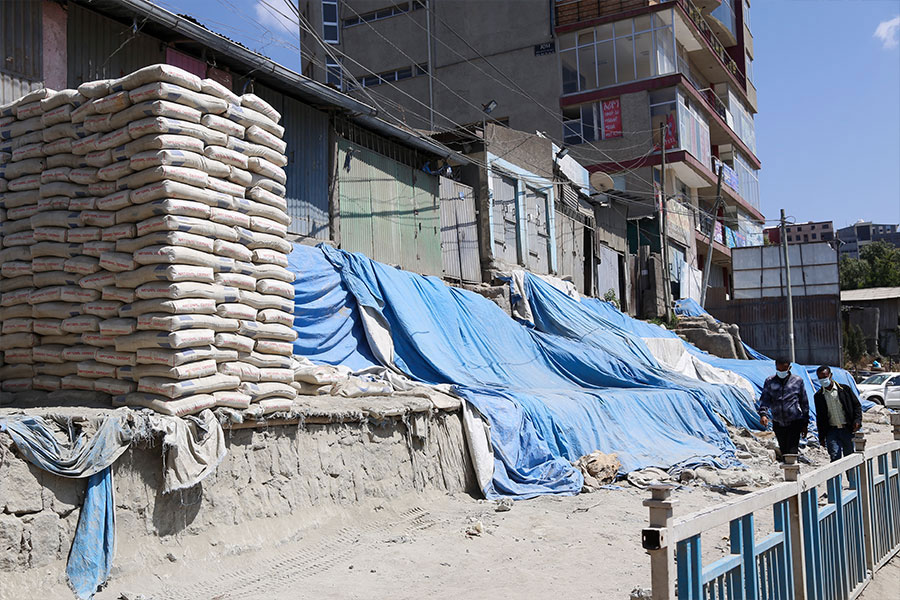
Radar | Apr 21,2024
Dashen Bank continued to tower as the industry's top performer judging by its latest financial reports released two weeks ago, despite losses from forex dealing remaining stubborn.
Addressing shareholders who met at the Sheraton Addis recently, the Bank's President, Asfaw Alemu, described the operating year as "another successful year." Experts concur.
"The performance is awe-inspiring," acknowledged Abdulmenan Mohammed, a financial statement analyst based in London who keenly follows the domestic financial sector. "Shareholders should be delighted."
The Bank delivered exciting news to shareholders doubling earnings per share (EPS), one of the highest in the industry. At 532 Br, the EPS is almost double last year's industry average. The marked increase in interest and fees, commission income, and reduction in foreign exchange loss contributed to Dashen Bank's net profit, 2.9 billion Br, significantly improved by 68.3pc from the previous year, compared to the preceding year's 12pc.
Its paid-up capital upsurged by 56.3pc to 6.86 billion Br, following shareholders' decision to inject 2.5 billion Br in fresh equity. This has positioned Dashen Bank to exceed the minimum capital threshold the central bank imposed on commercial banks in four years.
Shareholders have passed a resolution to further raise Dashen's capital to 12 billion Br before the deadline in 2026.
"We witness the growing number of new entrants into the market, expected to intensify competition," says Dulla Mekonnen, chairman of the board.
Not all was sinecure for one of the five largest private commercial banks in business for over a quarter of a century. Dashen continued to face enormous losses in foreign exchange dealings for three consecutive years, although the loss has dropped to 681 million Br from 1.04 billion Br from the previous year.
The decline in remittance flow through traditional money transfers such as Western Union and Money Gram is due to the enormous gaps between the official rate and the parallel market offers, says Yitagesu Ayalew, a branch manager around the Stadium area one of the 582 branches of Dashen Bank. It opened 128 additional branches last year, eight in the capital.
Although Yitagesu is pleased with the Bank's overall performance, particularly in deposit mobilisation and profit earnings, he observed a decline in the number of exporters at his branch following the central bank's decision to raise the forex surrender rate to 70pc.
The Bank's President is aware of the significance of the loss due to the depreciation of the Birr against a basket of major currencies.
"We'll work to manage it," he told Fortune.
Asfaw and his executives will have to work to boost loans and advances, including interest-free credits, which registered an increase of 23.9pc to 79.2 billion Br. This amount exceeds last year's industry average of private banks by 37 million Br. Deposit, too, grew by 22.4pc, upsurging to 91.24 billion Br, pushing loan to deposit ratio to 86.8pc, expanding by 1.1 percentage points from the previous year. The ratio is lower by three percentage points from what regulators put as a cap.
Dashen Bank has achieved more than double of average deposits of private banks recorded last year.
However, Abdulmenan cautions executives of the Bank to be mindful of further increases in the ratio as it could cause a liquidity crunch. Dashen Bank's liquid to total assets ratio increased by three percent, after cash, bank balances and reserve increased by 52.1pc to 16.9 billion Br. The interest paid on deposits grew by 14.9pc to 3.4 billion Br. Compared to the growth of deposits, the increase in interest expense is deemed reasonable.
Total assets soared, showing 23.7pc growth to 117.14 billion Br.
Dashen Bank's interest on loans and advances and the treasury bills it purchased from the central bank grew by 23.7pc to 9.85 billion Br. Fees and commissions jumped by 32.8pc to 2.55 billion Br.
Abdulmenan sees a "remarkable" increase in lending activities that drive growth.
Asfaw observed the banking industry had faced numerous challenges in the reported year. Central bank's tight monetary measures led to the industry surrendering two-thirds of foreign exchange earnings, an increase in the reserve requirement to seven percent, and the newly introduced requirement for banks to invest one percent of their outstanding loans in DBE bonds.
Dashen's provision for doubtful loans and other assets rose to 270 million Br from 254.1 million Br. According to Abdulmenan, the figure in recent years requires serious attention from the Bank.
The President argues that provisions stood at a healthy amount. He disclosed the Bank raised provision amounts for loans disbursed in conflict areas.
Yitagisu also agrees that instability in the northern part of the country somehow affected the Banks' performance.
PUBLISHED ON
Nov 27,2022 [ VOL
23 , NO
1179]

Radar | Apr 21,2024

Fortune News | May 27,2023

Radar | Feb 17,2024

Radar | Sep 03,2022

Viewpoints | Jun 08,2024

Fortune News | Nov 05,2022

Radar | May 27,2023

Radar | Jan 14,2023

Fortune News | Sep 02,2023

Fortune News | Jun 25,2022

Jul 13 , 2024 . By AKSAH ITALO
Investors who rely on tractors, trucks, and field vehicles for commuting, transportin...

Jul 13 , 2024 . By MUNIR SHEMSU
The cracks in Ethiopia's higher education system were laid bare during a synthesis re...

Jul 13 , 2024 . By AKSAH ITALO
Construction authorities have unveiled a price adjustment implementation manual for s...

Jul 13 , 2024
The banking industry is experiencing a transformative period under the oversight of N...

Jul 20 , 2024
In a volatile economic environment, sudden policy reversals leave businesses reeling...

Jul 13 , 2024
Policymakers are walking a tightrope, struggling to generate growth and create millio...

Jul 7 , 2024
The federal budget has crossed a symbolic threshold, approaching the one trillion Bir...

Jun 29 , 2024
In a spirited bid for autonomy, the National Bank of Ethiopia (NBE), under its younge...